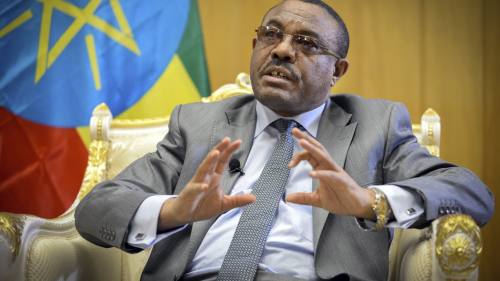It is tempting to call it an “
African spring”. In a matter of months, in countries as disparate as Angola and Zimbabwe, Ethiopia and South Africa, entrenched
leaders have been falling like ninepins. Last week, it was the turn of the Ethiopian prime minister,
Hailemariam Desalegn, who quit after years of public protest against the regime and increasingly open discord within the coalition that has run the country since 1991.
His sudden departure came just a day after, half a continent away,
Jacob Zuma finally agreed to resign as president of South Africa to make way for
Cyril Ramaphosa. Those dramatic events followed the even more unexpected fall of Zimbabwe’s Robert Mugabe, who many thought would die of old age before he was pushed from office. Instead, he took the hint that it was time to go when tanks rolled on to the streets of Harare last November. And just two months before that, in an orchestrated but still highly significant change of leadership in
Angola, João Lourenço took over as president from José Eduardo dos Santos, whose 38 years in charge beat Mr Mugabe’s stint by a year.
What on earth is going on? Should African leaders be shaking in their boots as renewal sweeps across the continent?
Africa, as people repeatedly point out, is not a country. It is a complex continent of diverse nations whose histories, languages and political cultures make them hard to meaningfully compare. There is no reason to believe that events in one have any connection to happenings in another. Yet that doesn’t mean there are no common themes. After all, countries in entirely different continents — take the Philippines, Hungary and the US — may be prone to the same forces of populism or nationalism.
One thing Angola, Ethiopia, South Africa and Zimbabwe have in common is they are run by liberation parties that have ossified in power for between a quarter and a half a century. In Angola, the Popular Movement for the Liberation of Angola has run the country since the Portuguese left in 1975. In Zimbabwe, Zanu-PF, which led the armed struggle against white minority rule, has been in power since 1980. Similarly, Mr Desalegn’s Ethiopian People’s Revolutionary Democratic Front has ruled since 1991, although he has been prime minister only since the death of Meles Zenawi in 2012. And in South Africa, yet another liberation movement, the African National Congress, has dominated power since apartheid crumbled in 1994.
In each case, these liberation parties are seeking to renew themselves after a generation or more in charge. The transition from exile to government has not always been easy. Power means money. In the case of Angola, huge oil exports and massive Chinese investments have meant a bonanza for the top party cadres, especially for anyone bearing the name dos Santos. In Zimbabwe, socialist rhetoric yielded to the reality of a destroyed economy for the many and rich pickings for a few party hacks loyal to Mr Mugabe. In South Africa, too, particularly in the Zuma years, the righteous task of spreading wealth to the black majority morphed into the less righteous one of spreading it to an ANC-connected black elite.
Change now is partly driven by the pent-up frustration of the millions left out. The public has found its voice, pushing the ruling elite to shuffle leaders in the cause of survival. In South Africa, by far the most democratic of the four, ANC support has skidded in successive elections and the party has lost control of four of the country’s most important cities. But even in the other three countries, where elections are far more controlled, opposition forces have found a way to express themselves, both through the ballot box and on the streets.
Will new leaders bring genuine change? In Ethiopia, Mr Desalegn’s resignation was followed by the
imposition of a state of emergency, hardly a sign of democratic opening. In Angola and Zimbabwe, the ruling parties have probably done enough to present the semblance of a new direction, though whether that translates into more inclusive policies is not yet clear. In South Africa, Mr Ramaphosa is seeking more than cosmetic changes in the interests of restoring both the ANC’s moral and electoral standing.
Still, in each country the ruling elite has engineered a personnel change in the interest of self-preservation. More than revolutions from below, they are party reorganisations from above. Other leaders on the continent will be watching, some fearfully. But “African spring” does not capture what is going on. You could call it instead the season of the palace coup.
